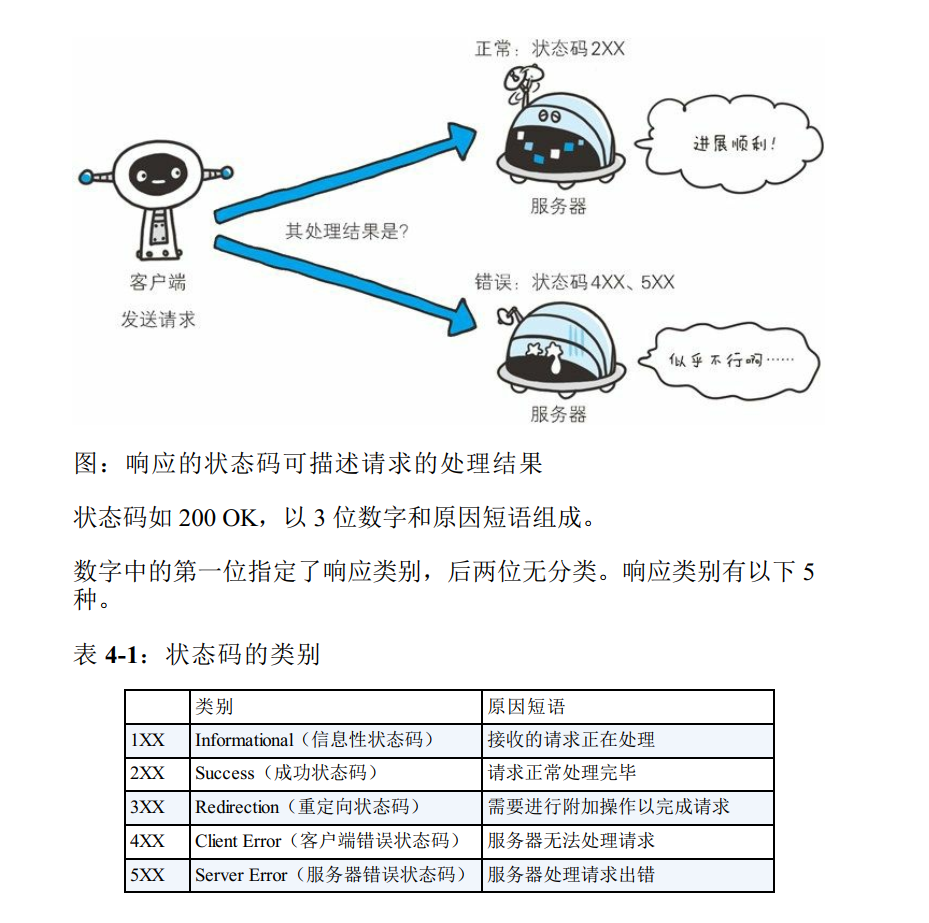
RFC 2616 HTTP/1.1 June 1999
The first digit of the Status-Code defines the class of response. The
last two digits do not have any categorization role. There are 5
values for the first digit:
- 1xx: Informational - Request received, continuing process
- 2xx: Success - The action was successfully received,
understood, and accepted
- 3xx: Redirection - Further action must be taken in order to
complete the request
- 4xx: Client Error - The request contains bad syntax or cannot
be fulfilled
- 5xx: Server Error - The server failed to fulfill an apparently
valid request
The individual values of the numeric status codes defined for
HTTP/1.1, and an example set of corresponding Reason-Phrase's, are
presented below. The reason phrases listed here are only
recommendations -- they MAY be replaced by local equivalents without
affecting the protocol.
Status-Code =
"100" ; Section 10.1.1: Continue
| "101" ; Section 10.1.2: Switching Protocols
| "200" ; Section 10.2.1: OK
| "201" ; Section 10.2.2: Created
| "202" ; Section 10.2.3: Accepted
| "203" ; Section 10.2.4: Non-Authoritative Information
| "204" ; Section 10.2.5: No Content
| "205" ; Section 10.2.6: Reset Content
| "206" ; Section 10.2.7: Partial Content
| "300" ; Section 10.3.1: Multiple Choices
| "301" ; Section 10.3.2: Moved Permanently
| "302" ; Section 10.3.3: Found
| "303" ; Section 10.3.4: See Other
| "304" ; Section 10.3.5: Not Modified
| "305" ; Section 10.3.6: Use Proxy
| "307" ; Section 10.3.8: Temporary Redirect
| "400" ; Section 10.4.1: Bad Request
| "401" ; Section 10.4.2: Unauthorized
| "402" ; Section 10.4.3: Payment Required
| "403" ; Section 10.4.4: Forbidden
| "404" ; Section 10.4.5: Not Found
| "405" ; Section 10.4.6: Method Not Allowed
| "406" ; Section 10.4.7: Not Acceptable
Fielding, et al. Standards Track [Page 40]
�
RFC 2616 HTTP/1.1 June 1999
| "407" ; Section 10.4.8: Proxy Authentication Required
| "408" ; Section 10.4.9: Request Time-out
| "409" ; Section 10.4.10: Conflict
| "410" ; Section 10.4.11: Gone
| "411" ; Section 10.4.12: Length Required
| "412" ; Section 10.4.13: Precondition Failed
| "413" ; Section 10.4.14: Request Entity Too Large
| "414" ; Section 10.4.15: Request-URI Too Large
| "415" ; Section 10.4.16: Unsupported Media Type
| "416" ; Section 10.4.17: Requested range not satisfiable
| "417" ; Section 10.4.18: Expectation Failed
| "500" ; Section 10.5.1: Internal Server Error
| "501" ; Section 10.5.2: Not Implemented
| "502" ; Section 10.5.3: Bad Gateway
| "503" ; Section 10.5.4: Service Unavailable
| "504" ; Section 10.5.5: Gateway Time-out
| "505" ; Section 10.5.6: HTTP Version not supported
| extension-code
extension-code = 3DIGIT
Reason-Phrase = *<TEXT, excluding CR, LF>



